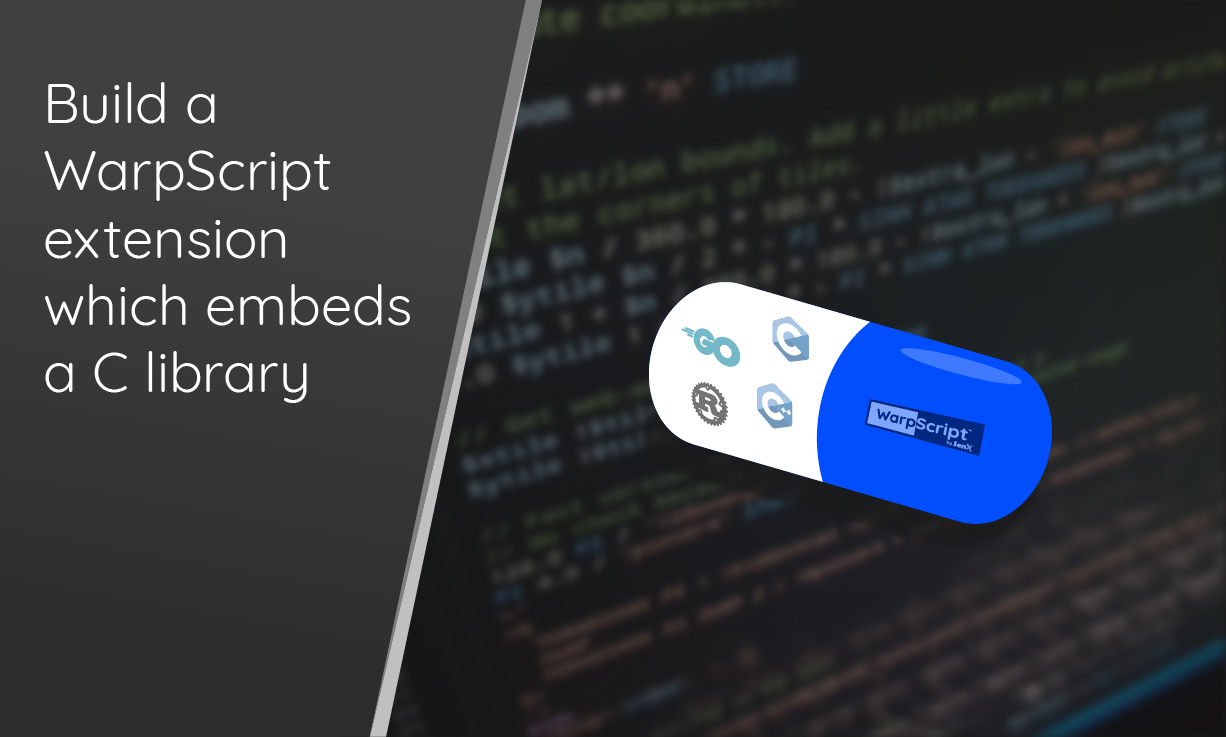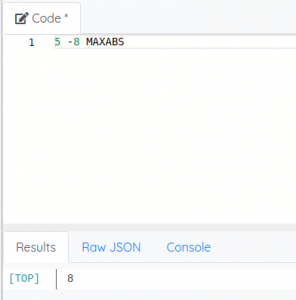Learn how to embed Java library or C code in a WarpScript/FLoWS function to enlarge the WarpLib function corpus.

With WarpScript (and obviously FLoWS), you have access to a huge corpus of functionalities to handle your time series. But sometimes, we miss a special algorithm or a proprietary library.
You can encapsulate it in an extension dedicated to Warp 10 and gain access to new WarpScript/FLoWS functions.
We will show you how to build an extension containing a Java implementation of a function and an external C program.
Initiate your project
The easiest way is to use WarpFleet CLI.
$ npm install -g @senx/warpfleet
$ wf i
___ __ _______________ _____
__ | / /_____ __________________ ____/__ /___________ /_
__ | /| / /_ __ `/_ ___/__ __ \_ /_ __ /_ _ \ _ \ __/
__ |/ |/ / / /_/ /_ / __ /_/ / __/ _ / / __/ __/ /_
____/|__/ \__,_/ /_/ _ .___//_/ /_/ \___/\___/\__/
/_/ ™
version: 1.0.41
? What do you want to develop? Extension
? Enter project's group: io.warp10.ext.test
? Enter assets's name: test-extension
? Enter assets's version: 0.0.1
? Enter project's description:
? Enter author's name:
? Enter email address:
? Enter license:
? Enter GIT repo url:
? Enter Maven repo url root: https://dl.bintray.com/myCompany/maven/
? Comma separated list of tags:
? Is all OK, dude?
{
"type": "ext",
"group": "io.warp10.ext.test",
"artifact": "test-extension",
"version": "0.0.1",
"description": "",
"author": "",
"email": "",
"license": "",
"git": "",
"repoUrl": "https://dl.bintray.com/myCompany/maven/",
"tags": [
""
]
} Yes
✔ Bootstrap generated
? test-extension/README.md already exists, do you want to overwrite it? Yes
✔ Artifact generated
✔ Asset generatedOpen the test-extension folder with your favorite Java IDE.
Java implementation
Delete those two classes and create in this directory a file named MAXABS.java
package io.warp10.ext.test;
import io.warp10.script.NamedWarpScriptFunction;
import io.warp10.script.WarpScriptException;
import io.warp10.script.WarpScriptStack;
import io.warp10.script.WarpScriptStackFunction;
public class MAXABS extends NamedWarpScriptFunction implements WarpScriptStackFunction {
public MAXABS(String name) {
super(name);
}
@Override
public Object apply(WarpScriptStack stack) throws WarpScriptException {
int a = Integer.parseInt(stack.pop().toString());
int b = Integer.parseInt(stack.pop().toString());
stack.push(Math.max(Math.abs(a), Math.abs(b)));
return stack;
}
}
This is the implementation of a function called MAXABS which computes the maximum absolute value of 2 parameters. I agree, this is a dummy function and I do not test input parameters.
The process is easy:
- extract parameters with
stack.pop() - compute the maximum of absolute values
- push the result back on the stack with
stack.push()
Create TestWarpScriptExtension.java:
package io.warp10.ext.test;
import io.warp10.warp.sdk.WarpScriptExtension;
import java.util.HashMap;
import java.util.Map;
public class TestWarpScriptExtension extends WarpScriptExtension {
private static final Map<String, Object> functions;
static {
functions = new HashMap<String, Object>();
functions.put("MAXABS", new MAXABS("MAXABS"));
}
@Override
public Map<String, Object> getFunctions() {
return functions;
}
}This is the entry point of our extension. We must declare function names (ie: MAXABS) and associate them to real implementations (ie: new MAXABS("MAXABS"))
You can now package the lib:
$ ./gradlew shadowJarCopy the resulting jar in /path/to/warp10/lib/. activate your extension in /path/to/warp10/etc/conf.d/70--extensions.conf:
warpscript.extension.test=io.warp10.ext.test.TestWarpScriptExtensionFinally, restart your Warp 10 instance and test your new MAXABS function.
C implementation
Create test-extension/src/main/c/helloworld.h:
char *hello(char* ch);Create test-extension/src/main/c/helloworld.c:
#include "helloworld.h"
#include <stdlib.h>
#include <stdio.h>
#include <string.h>
char* hello(char* ch) {
char prefix[] = "Hello ";
char *res;
res = malloc(strlen(prefix) + strlen(ch));
strcpy(res, prefix);
strcat(res,ch);
return res;
}Disclaimer: I haven't coded with C since ages, so sorry for that
Hey wait, there is a malloc without a free… Ok, we will see how to free later.
Compile it:
$ cd src/main/c
$ gcc -c helloworld.c
$ gcc -shared -dynamiclib helloworld.o -o ../resources/helloworld.soNow we will bind this small program with our extension thanks to JNA.
Add the dependence to your build.gradle:
implementation group: 'net.java.dev.jna', name: 'jna', version: '5.10.0'Create interface CHelloWorld.java:
package io.warp10.ext.test;
import com.sun.jna.Library;
import com.sun.jna.Native;
import com.sun.jna.Pointer;
public interface CHelloWorld extends Library {
CHelloWorld INSTANCE = Native.load("helloworld.so", CHelloWorld.class);
Pointer hello(String g);
void free(Pointer p); // JNA provides it
}Here is our binding, now, we have to embed it into a new function: HELLO.class
package io.warp10.ext.test;
import io.warp10.script.NamedWarpScriptFunction;
import io.warp10.script.WarpScriptException;
import io.warp10.script.WarpScriptStack;
import io.warp10.script.WarpScriptStackFunction;
public class HELLO extends NamedWarpScriptFunction implements WarpScriptStackFunction {
public HELLO(String name) {
super(name);
}
@Override
public Object apply(WarpScriptStack stack) throws WarpScriptException {
Pointer ptr = null;
try {
String str = stack.pop().toString();
ptr = CHelloWorld.INSTANCE.hello(str); // invoke the C function
stack.push(ptr.getString(0));
} catch (Exception e) {
throw new WarpScriptException(e);
} finally {
if (null != ptr) {
CHelloWorld.INSTANCE.free(ptr); // Free the allocated memory
}
}
return stack;
}
}We use the same principle as a standard java library. And the declare this function:
public class TestWarpScriptExtension extends WarpScriptExtension {
private static final Map<String,Object> functions;
static {
functions = new HashMap<String,Object>();
functions.put("MAXABS", new MAXABS("MAXABS"));
functions.put("HELLO", new HELLO("HELLO")); // <----- new code
}Re-build your jar, deploy it, restart Warp 10 and test it:
TADAAA!
Going further
Of course, the same techniques apply for any Java/Groovy/Scala (or whatever runs natively on the JVM) or for C++, Go, or Rust.
Feel free to build custom extensions and contribute to the growing WarpFleet ecosystem.
Learn more about WarpFleet
Read more
Runners dynamic scheduling
Thinking in WarpScript – Fetch data within a temporal or a count range
Captain's Log, Stardate 4353.3

Senior Software Engineer


